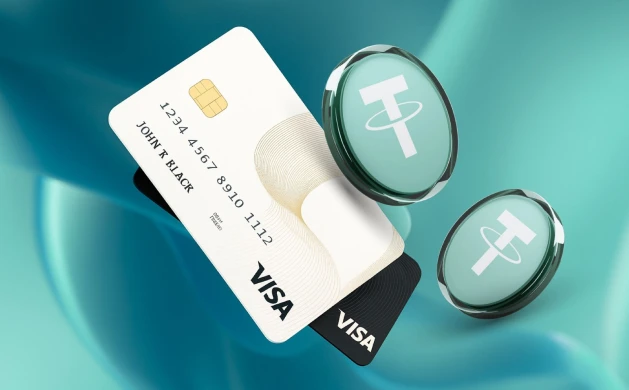Football.Fun Explained: Player Shares, Free vs Pro & Rewards
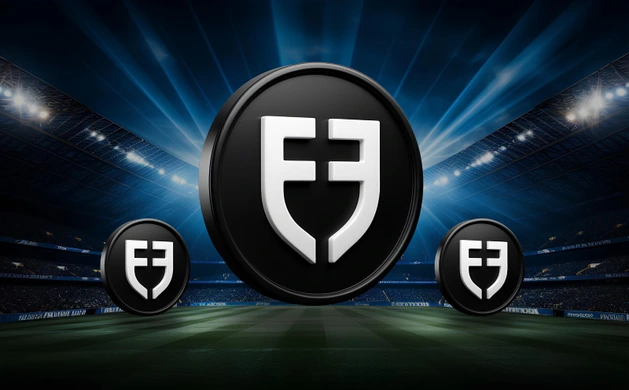
Summary: Football.Fun is an onchain fantasy football app on the Base network where users trade player shares, enter tournaments, and compete through contract-based gameplay. Rewards are built around skill and strategy, not just capital size, giving sharp calls more weight than deep pockets.
The platform runs a peer-to-peer marketplace with proportional payouts and no native token. Instead, the economy revolves around Gold, Tournament Points, and Skill Points, with 95% of fees and revenues paid back to players in USDC, reinforcing fairness and sustainability.
Every cycle brings a breakout product with real traction. Right now the spotlight is on Football.Fun, an onchain fantasy football app where football knowledge can turn into earnings.
The idea is simple. Users trade tokenized player shares, contract them into matches, and earn rewards when their picks perform. It mirrors traditional fantasy sports, but the onchain layer makes every move higher stakes.
Since launch, Football.Fun has processed nearly 40 million dollars in trading volume and attracted more than 13,000 wallets. With no FDF token driving speculation, adoption has been fueled by real gameplay and market activity rather than token incentives.
In the sections ahead, we will explain how Football.Fun works, why the no-token model matters, and what its early growth signals for 2025.
What is Football.Fun?
Football.Fun is a fantasy football prediction game where players compete by owning tokenized shares of footballers like Kylian Mbappe and Lamine Yamal. It covers Europe’s five major leagues (EPL, La Liga, Bundesliga, Serie A, Ligue 1) along with UEFA Champions League and Europa League tournaments.
You can play Football.Fun for free or with crypto on the Base layer 2 network. The objective is to collect player shares, keep them contracted, and compete in 2x weekly tournaments to earn points. Each footballer starts with four contracts that are consumed when used, with renewals costing about 1% of the purchase price.
While larger portfolios can scale rewards, the game focuses on skill-based play through leaderboards that measure efficiency of picks. Success comes from identifying undervalued footballers, timing trades in the peer-to-peer marketplace, and maximizing outcomes against active share distribution.
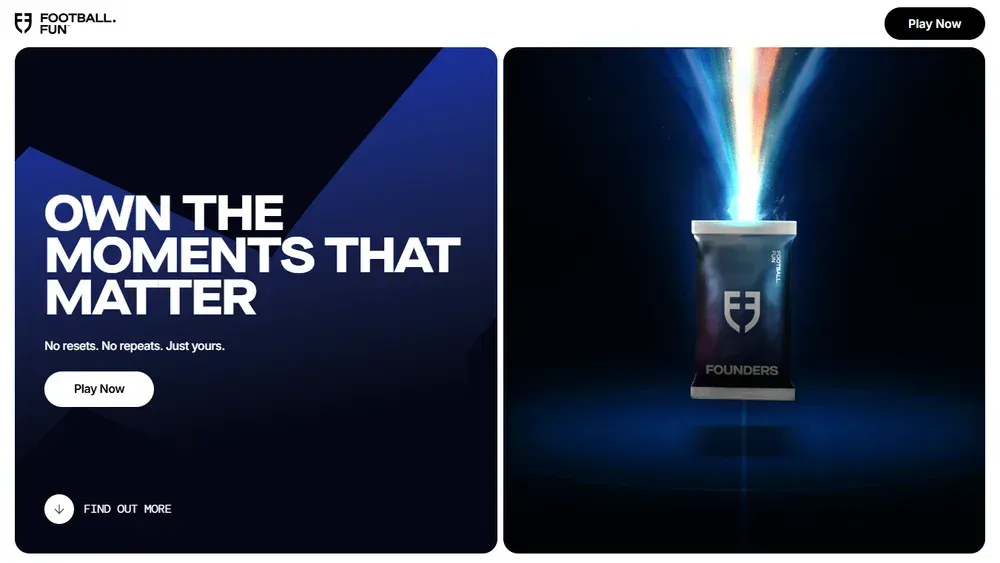
How Does Football.Fun Work?
Football.Fun (also abbreviated as FDF) integrates fantasy sports mechanics with decentralized trading, allowing participants to compete in tournaments using digital football assets. FDF works as a Web3 fantasy game where strategy involves both squad management and blockchain-based market activity.
The core components of Football.Fun are:
- Player Shares: Tokenized footballers function as blockchain assets that can be owned, traded, and utilized for fantasy competition.
- Scoring System: Performances are rated with granular stats, e.g. a goal is +50, an assist +30, a clean sheet up to +40, while errors like own goals or red cards carry penalties as steep as -20.
- Tournaments: Twice-weekly competitions automatically enroll active squads, rewarding participants based on player performance and decentralized share distribution.
- Currencies: Gold, Tournament Points, and Skill Points form a layered in-game economy connecting free-to-play progression and crypto-enabled trading.
- Contracts: Each share includes limited-use contracts, ensuring players only earn rewards when actively competing in real football matches.
- Marketplace: A decentralized exchange where player values fluctuate through supply, demand, liquidity pools, and Web3 fee structures.
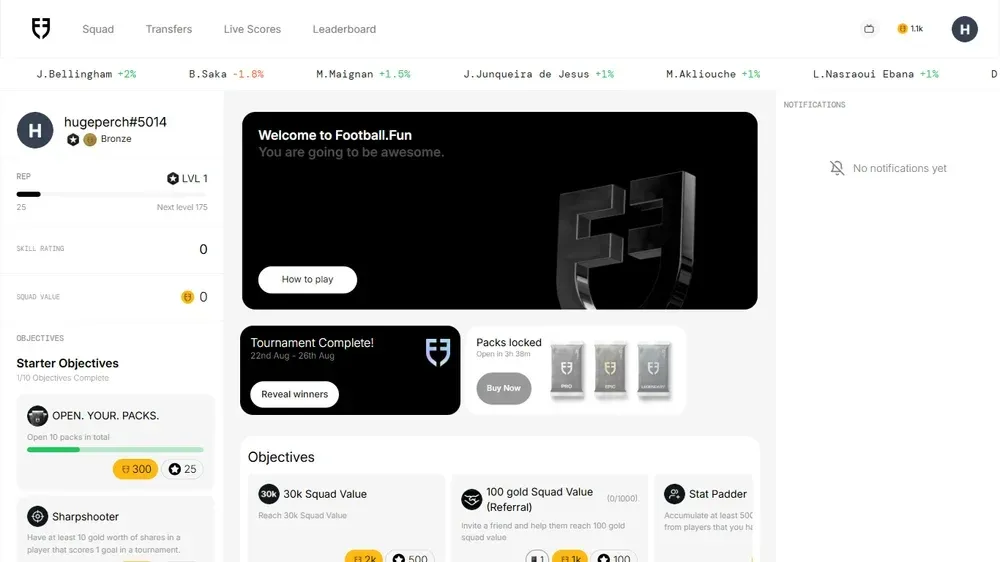
Football.Fun Free-to-Play vs Pro Explained
The distinction between Free-to-Play and Pro in Football.Fun is less about gameplay structure and more about accessibility and risk. Free-to-Play is universally available, while Pro involves the use of real capital, making it subject to regional restrictions and regulatory limits. As of now, both versions share the same leaderboard.
In the Football.Fun Free-to-Play mode, users begin with 300 Tournament Points, three starter packs, and around 1,000-1,100 gold virtual currency from onboarding rewards. Progression relies entirely on in-game currencies, with packs recharging every four hours and rewards earned through tournaments.
By contrast, the Football.Fun Pro version requires players to fund a wallet with USDC on the Base network, where gold is pegged 1:1 to stablecoins. Trading introduces 5% marketplace fees, surge and anti-dump taxes, adjustable slippage, and reward pools that scale directly with overall platform activity.
How to Play Football.Fun
Playing Football.Fun means registering an account, building a squad, and competing in twice-weekly fantasy football tournaments. The process follows a clear sequence of steps, including:
- Sign Up: Register on the Free-to-Play app or Pro platform; Pro requires funding a Base wallet with USDC, while the free FDF version starts instantly with in-game "gold" currency.
- Verify Access: Confirm your email (check spam folders if needed, whitelist "no-reply@mail.privy.io"), and optionally use invite codes for bonus rewards.
- Collect Players: Open starter packs to receive tokenized shares of footballers, or acquire more shares through the in-game marketplace.
- Build Your Squad: Promote development players into your active squad with Skill Points, or cut them for a partial return of Tournament Points.
- Compete in Tournaments: Twice a week, active squads automatically enter contests, with rewards based on real-world performance and share ownership.
- Earn and Reinvest: Tournament Points unlock packs, Skill Points grow players, and gold can be traded or recycled into new acquisitions.
- Trade on Marketplace: Buy or sell player shares in real time, with dynamic pricing influenced by demand, fees, and liquidity.
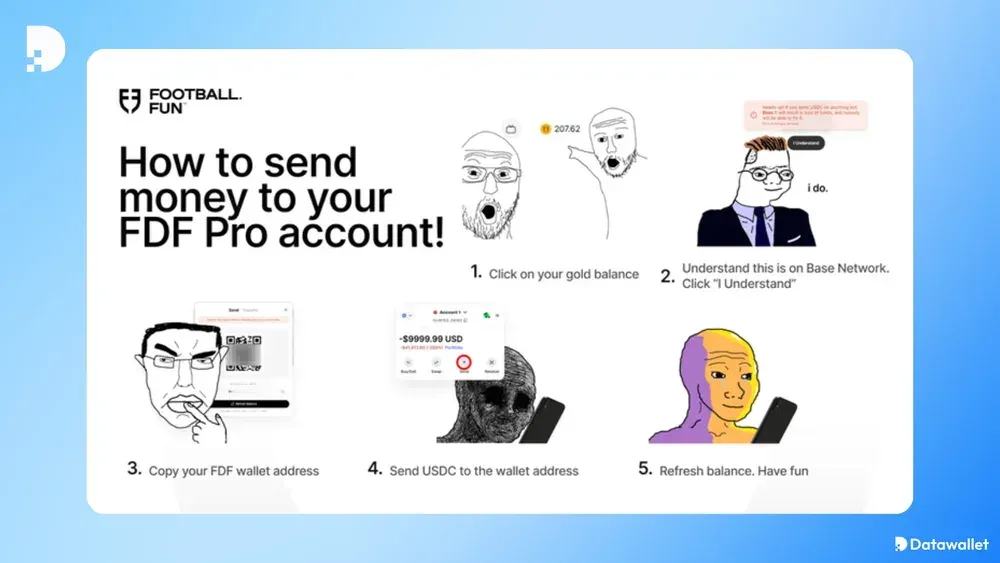
Key Features of Football.Fun
Beyond its basic gameplay loop, Football.Fun includes layered systems that dictate player progression and competitive outcomes. These features range from accessible entry points to market-driven mechanics, all designed to sustain long-term engagement. Here are several of the key gaming features of FDF:
Packs and Player Distribution
Football.Fun offers randomized Player Packs containing four footballers, each with a variable number of shares. Packs come in three tiers: Pro (small allocations), Epic (medium), and Legendary (large).
Pack pricing resets dynamically at the start of each tournament to balance supply with Tournament Points earned. Players receive one pack every four hours (up to two stored), while no more than nine packs can be opened in a 24-hour period.

Player Shares and Contract Utility
Each footballer is capped at 25 million shares, with an initial release of 1.6 million shares and 20,000 gold in value seeded. All shares are only tradable through the Football.Fun marketplace.
Every share carries four contracts by default, consumed only when the footballer actually plays. Renewals cost about 1% of purchase price per match, keeping inactive players from draining resources while linking share value to active participation.
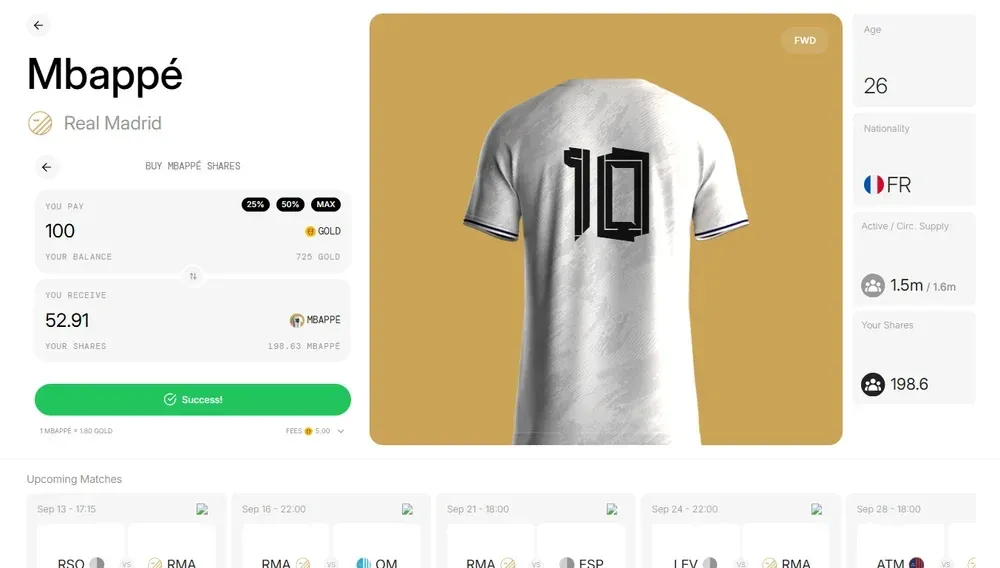
Rewards and Progression Systems
FDF tournament prize pools scale with platform trading volume, and rewards are distributed proportionally based on player performance and ownership. For outfielders, the top five positions pay out (1st = 10%, 2nd = 6%, 3rd = 4%, 4th = 2%, 5th = 1%). For goalkeepers, the top three pay out (1st = 7%, 2nd = 3%, 3rd = 2%).
Progression is influenced by Tournament Points and Skill Points: Tournament Points open new packs, while Skill Points promote Development Squad players into Active Squads. The bottom 25% of entrants in each tournament earn no Skill Points, reinforcing performance pressure.

Leaderboards and Competitive Ranking
Beyond rewards, Football.Fun incentivizes efficiency with a Skill Rating system measures efficiency by counting only a user’s top 11 players in a tournament, with multipliers applied (1st place x2, 2nd x1.5, 3rd-5th x1.25). This allows smaller squads with high-performing players to compete with larger portfolios.
Users receive 18 free substitutions per tournament; after that, penalties apply (19-21 subs = x0.9 SR, 22-24 subs = x0.75, 25+ = x0.3). Reputation (Rep) adds another progression layer, rewarding social activity and achievements, with a maximum level of 50.

Does Football.Fun Have an FDF Token?
Football.Fun does not have its own standalone cryptocurrency or governance token (a.k.a $FDF), unlike many Web3 gaming projects. Instead, its design deliberately avoids speculative tokens, relying on stablecoin-pegged gold and in-game points to keep the economy focused on playing and trading.
On a livestream, co-founders Adam and Caleb explained that their goal was never to launch an NFT or token sale first and then spend years building a game around it. Instead, they focused on delivering a fun, skill-based experience from the start, ensuring gameplay came before any financial instrument.
Football.Fun Growth and Adoption Metrics
Onchain data from Dune Analytics shows Football.Fun scaling quickly since mid-2025, both in trading activity and user adoption. As of September 1st, 2025, cumulative marketplace volume had reached $39.7 million, generating over $2.65 million in fees.
Adoption is also rising steadily: there are now 13,383 unique wallet addresses linked to Football.Fun, with hundreds of new wallets added weekly. The platform’s total value locked (TVL) sits at roughly $10.5 million, supported by consistent inflows exceeding outflows.
Individual player markets mirror this growth. Lamine Yamal has a circulating market cap of $4.1 million with over 3,100 unique holders, while Kylian Mbappé follows closely with $2.5 million and more than 3,300 holders. Harry Kane sits at around $1.6 million with roughly 2,600 holders, and Mohamed Salah records $1.3 million with more than 2,400 holders.

Risks of Using Football.Fun
Like any early-stage Web3 platform, Football.Fun carries risks that extend beyond football knowledge and squad management. Users should be aware of technical, financial, and regulatory factors that can directly affect their experience. Key risks of FDF include:
- Platform Stability: As seen during the Day 6 launch in August 2025, heavy demand caused API restarts and trading delays, leaving many users unable to execute transactions reliably.
- Financial Exposure: In the Pro version, gold reflects USDC value directly on Base, so price swings, surge fees, or poorly timed trades can result in tangible monetary losses.
- Liquidity Risks: Player shares are only tradable within the Football.Fun marketplace, so thin liquidity or sudden shifts in demand can make it difficult to exit positions.
- Regulatory Restrictions: Access to Pro is region-dependent, with some jurisdictions limiting real-money fantasy play, which can restrict participation or create compliance concerns.
- Smart Contract Vulnerabilities: Because Football.Fun is fully onchain, flaws in deployed contracts or integrations could expose funds to technical exploits.
- Gameplay Pressure: The bottom 25% of participants in tournaments receive no Skill Points, introducing a competitive floor that can disadvantage casual players.
Where is Football.Fun Restricted?
Football.Fun’s free version is open worldwide, but access to the Pro platform is limited by jurisdiction. The restrictions come from differing crypto and gaming regulations, which means availability depends largely on where you connect from. You can read the full list in FDF's Geofencing page.
At present, users in dozens of countries and US states cannot access the Pro service, including major markets such as the United Kingdom, Australia, Singapore, Japan, and Switzerland. Several US states, among them Arizona, Hawaii, Idaho, Montana, Nevada, and Utah, are also excluded, alongside regions with strict crypto bans such as China, Iran, and North Korea.
The company also issues tailored legal notices in areas like the US, EEA, and Hong Kong, clarifying that its in-game assets are classified as utility tokens rather than securities. These statements underscore that availability is not just a technical matter of IP blocking but a regulatory one affected by changes in financial oversight.
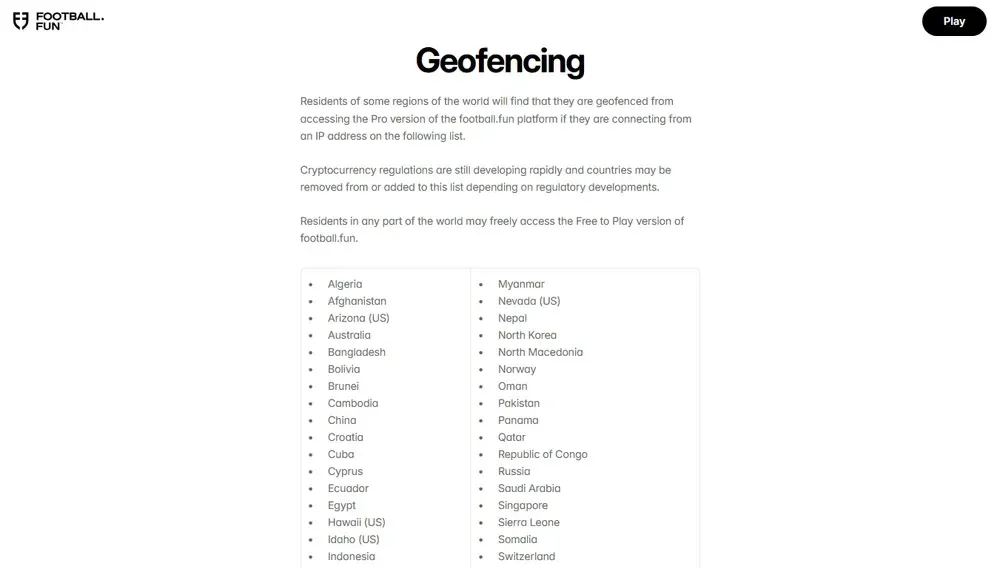
Final Thoughts
With the 2025/26 European football season just starting, we see Football.Fun launching at the right moment to capture the competitive energy from football supporters worldwide.
We appreciate how the team incorporates community feedback, delivering updates like skill-based leaderboards, competitive divisions, and mechanics that reward sharper strategic decision-making.
We believe this blend of openness, iteration, and identical free or paid gameplay creates one of the strongest onboarding flows we've seen in crypto in recent years.
Frequently asked questions
Who has funded Football.Fun so far?
Football.Fun raised $2 million in July 2025 from investors including 6th Man Ventures, Sfermion, Zee Prime Capital, Coin Operated Group, and Devmons. The funding details remain largely undisclosed, but the round signals confidence in Football.Fun’s long-term sustainability as a Web3 gaming project.
What happens when a player retires or becomes inactive?
If a footballer retires or falls out of circulation, their shares can eventually be phased out. Holders may still trade them peer-to-peer, but they no longer contribute to tournaments once activity stops.
How are new footballers added to Football.Fun?
Initially, the platform focused on stars from Europe’s top five leagues and international tournaments. In the future, players can influence new additions through a scouting system that uses “scout points,” giving the community a role in expanding the roster.
How does Football.Fun prevent inflation of player shares?
Each footballer has a capped supply of 25 million shares, with an initial release of 1.6 million. Additional shares are issued based on demand through packs or marketplace activity, preventing unchecked inflation and aligning supply with actual gameplay interest.
%25201%2520(1).webp)
Written by
Emily Shin
Research Analyst
Emily is passionate about Web 3 and has dedicated her writing to exploring decentralized finance, NFTs, GameFi, and the broader crypto culture. She excels at breaking down the complexities of these cutting-edge technologies, providing readers with clear and insightful explanations of their transformative power.

.webp)
%2520(1).webp)
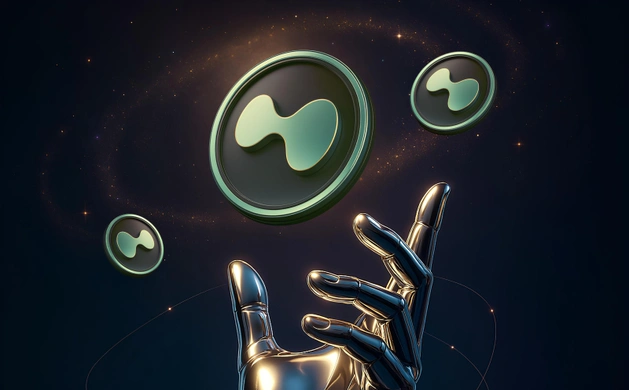
.webp)
